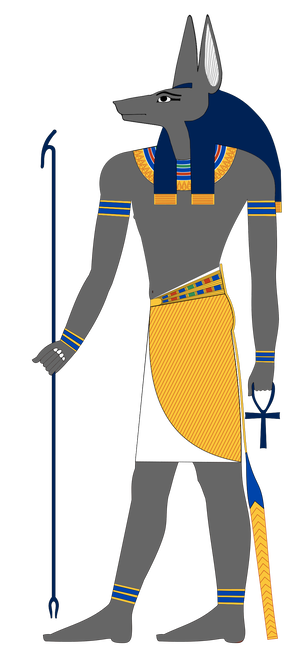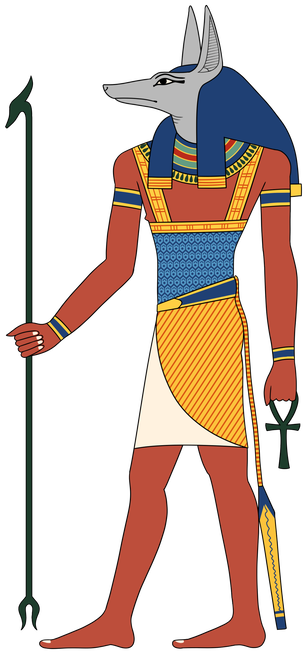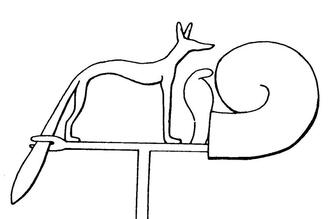Per-Wapwawet
𓄋𓈐𓏏 𓄋𓊪𓈐𓏥𓀭 𓄋𓈐𓏏𓏥𓃧 𓄋𓈐𓈐𓈐𓃧
𓄋𓈐𓏥 𓄋𓊪𓏴𓈐𓏏𓏺𓀭 𓄋𓈐𓏏𓏥𓀭 𓄋𓈐𓈐𓈐𓃣
𓄋𓈐𓈐𓈐𓏏𓃧 𓄋𓊪𓈐𓏏𓏥 𓄋𓈐𓈐𓈐𓀭
𓄋𓈐𓏏𓏥 𓄋𓊪𓈐𓏏𓏥 𓃧 𓃧 𓄋𓈐𓏏𓃧 𓄋𓈐𓏏𓏥𓃧 𓄋𓈐𓈐𓈐 𓄋𓈐𓃧
MDC: wp-wAwt , wpwAw.t , wp(w)-wA.wt
Gardiner: wp-wꜢw.t, Wepwawet
Budge: Ȧp-uat
Alt Egyptian: wp-wꜢ.wt
Transliteration: Wapwawet, Uapuaut
Coptic: Opouēoui, ouowweeowwi, wb-awā-awi ?(Old B), wp-ueu-ā-uē ? (S) /ⲟⲡⲟⲩⲏⲟⲩⲓ
Hebrew:
Greek: Ophôis/ Ὀϕῶις
Modern Greek: Oupouaoút/Ουπουαούτ
Demotic: wp-wꜢwt
Arabic: Wbwawt / وبواوت
English: Wepwawet
Kemetic: Wapwawet
Pronounced: Wepwawet or Wapwawet (traditional); (alt) Upuaut, Upooēooit (Probably more accurate); (possibly) Upuēuē
Alt : Wepiu, Wepuaut, Wep-wawet, Wepawet
Meaning: "Opener of the path/road ways" - /wp(i)/ 𓄋𓊪𓀁 "open, judge, discern, distinguish" + /wAwt/ 𓈐𓏏𓏥 "ways, road"
Gardiner: wp-wꜢw.t, Wepwawet
Budge: Ȧp-uat
Alt Egyptian: wp-wꜢ.wt
Transliteration: Wapwawet, Uapuaut
Coptic: Opouēoui, ouowweeowwi, wb-awā-awi ?(Old B), wp-ueu-ā-uē ? (S) /ⲟⲡⲟⲩⲏⲟⲩⲓ
Hebrew:
Greek: Ophôis/ Ὀϕῶις
Modern Greek: Oupouaoút/Ουπουαούτ
Demotic: wp-wꜢwt
Arabic: Wbwawt / وبواوت
English: Wepwawet
Kemetic: Wapwawet
Pronounced: Wepwawet or Wapwawet (traditional); (alt) Upuaut, Upooēooit (Probably more accurate); (possibly) Upuēuē
Alt : Wepiu, Wepuaut, Wep-wawet, Wepawet
Meaning: "Opener of the path/road ways" - /wp(i)/ 𓄋𓊪𓀁 "open, judge, discern, distinguish" + /wAwt/ 𓈐𓏏𓏥 "ways, road"
{PD-US}}
Home: Lycopolis/ Λυκόπολις in the Greco-Roman period, Asyut in Upper Egypt
Temple: sAwt/Asyut/ Sioout/ⲥⲓⲟⲟⲩⲧ, Siōwt/ⲥⲓⲱⲟⲩⲧ
Nome: 13th Upper Egypt, (A)s(A)ut Lycopolis 𓉄
Patrons worshiped: Wepwawet and Anpu
Cult Center Of Wapwawet in the Egyptian City of Atef-Khent in the Capital City of sAwi.ty/Sauty 𓊃𓅭𓅱𓏏𓊖, in Copticⲥⲓⲟⲟⲩⲧ/Syowt, in Greek Λυκούπολις/Lycopolis 'City of Wolves', the modern city of capital أسيوط/ Asyut.
Consort
Wpt-wAwt/Oupet-ouaout "she who opens the paths" (rare, Abydos )
Children
Parents
Anpu/ Anubis and Anput
Siblings
Anpu/ Anubis (When father is Sutekh/ Set or Wesir/Osiris) brother
Horus the Child
Alternative Parentage
Setesh/Set and Nebet-Hut/ Nephthys
Wesir/Osirus and Auset/Isis
Priest names
Features
An anthropomorphic gray or white wolf with a bow and arrows and a shield
Symbols
Bow and Arrows
Shields
Mace
Adze
Road ways
Gray wolf
Was secpter
Roles
God Of warfare, hunting, protector of the kind in battle, opener of the ways for the deceased in the Duat
personification of the Winter Solstice (Ȧnpu : Summer Solstice); considered the opener of the roads of the South (Ȧnpu : Opener roads to the North)
Connection to other gods
Anpu/ Anubis
Celebrations
Offering items
Bow and Arrows
Shields
club
Keys
Myrrh
Beer
Duck
Beef
Lamb
Goat
Other names
Epitaphs
sxm tAwy-- power of the two lands, form of Wesir himself (Ȧnpu: sxm m pt/ Power of heaven)
wpwAwt nb tA Dsr Hry-ib AbDw-- Wepwawet, lord of the holy land (necropolis), dwelling in Abydos
wp-wAwt nb tA Dsr--Wepwawet, lord of the Sacred Land,
Temple: sAwt/Asyut/ Sioout/ⲥⲓⲟⲟⲩⲧ, Siōwt/ⲥⲓⲱⲟⲩⲧ
Nome: 13th Upper Egypt, (A)s(A)ut Lycopolis 𓉄
Patrons worshiped: Wepwawet and Anpu
Cult Center Of Wapwawet in the Egyptian City of Atef-Khent in the Capital City of sAwi.ty/Sauty 𓊃𓅭𓅱𓏏𓊖, in Copticⲥⲓⲟⲟⲩⲧ/Syowt, in Greek Λυκούπολις/Lycopolis 'City of Wolves', the modern city of capital أسيوط/ Asyut.
Consort
Wpt-wAwt/Oupet-ouaout "she who opens the paths" (rare, Abydos )
Children
Parents
Anpu/ Anubis and Anput
Siblings
Anpu/ Anubis (When father is Sutekh/ Set or Wesir/Osiris) brother
Horus the Child
Alternative Parentage
Setesh/Set and Nebet-Hut/ Nephthys
Wesir/Osirus and Auset/Isis
Priest names
Features
An anthropomorphic gray or white wolf with a bow and arrows and a shield
Symbols
Bow and Arrows
Shields
Mace
Adze
Road ways
Gray wolf
Was secpter
Roles
God Of warfare, hunting, protector of the kind in battle, opener of the ways for the deceased in the Duat
personification of the Winter Solstice (Ȧnpu : Summer Solstice); considered the opener of the roads of the South (Ȧnpu : Opener roads to the North)
Connection to other gods
Anpu/ Anubis
Celebrations
Offering items
Bow and Arrows
Shields
club
Keys
Myrrh
Beer
Duck
Beef
Lamb
Goat
Other names
Epitaphs
sxm tAwy-- power of the two lands, form of Wesir himself (Ȧnpu: sxm m pt/ Power of heaven)
wpwAwt nb tA Dsr Hry-ib AbDw-- Wepwawet, lord of the holy land (necropolis), dwelling in Abydos
wp-wAwt nb tA Dsr--Wepwawet, lord of the Sacred Land,
Hymn to Wepwaswet
Hail to You, Upuaut,
Bull of offerings and Lord of provisions,
Great of the 'Ureret'-Crown (the White Crown),
Who came forth from the womb of His mother Nut to receive the 'Ureret'-Crown,
Eldest God, Who came forth from His mother's womb already wise,
and to Whom Geb has ordered His heritance.
Great God, Lord of 'Rosetau' (the NetherWorld),
may You place me among the followers and the blessed nobles who are behind You!
~The offering chapel of the "reporter of the vizier" Sesostri XIII Dynasty
The god's sealer of Abydos Wenemi, vindicated,
he says: hail to you Wepwawet,
who separated heaven from earth!
Jackal of Upper Egypt, who came forth from Nut,
your face appears upon her thighs
in this your name of Jackal of Upper Egypt;
~Egypt: Temple of the Whole World : Studies in Honour of Jan Assmann



